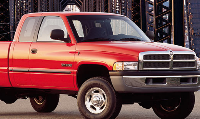People with 4.56's Report In (More technical than average Qs)
#1
Well my 33's just came today so now its time for 4.56 gears. Most people just ask the same repetitive question of " are these gears too much?" but my question is regarding the VSS sensor and other components affected by the gears. Obviously your Torque Converter is going to be affected also because its in direct relationship with the VSS. I have a superchips programmer to recalibrate for larger tires and all I would need to do is change the teeth of the sprocket gear on the VSS correct? If the teeth are not changed the torque converter would lock up to early if im not mistaken. Anything else that will be thrown off with 4.56 gears? I also know in some applications VSS also has some control over the fuel delivery,ignition, etc. So just curious. Thanks
#5
#6
Since your truck is a 2000, you do not need to make any changes to anything to compensate for the gears. The VSS will not be impacted by the gear change. You only need to modify the PCM for tire size changes, not for gear changes. You do not touch the speed sensor sprocket.
The reason is, on '99 and newer trucks, the PCM gets its signals from the VSS sensor that is mounted on top of the rear axle. Its reading comes from the tone ring on the rear differential. The pulses the sensor are picking up do not change with a gear change. One revolution is one revolution, no matter what gears you have. So changing gears does not require any kind of recalibration for the VSS to adjust things like the speedometer or trans kickdown/shift points (which the PCM controls based on inputs from the VSS).
Tire size changes, however, do because a taller tire has a larger diameter and will travel further per rotation, thus making one revolution longer then it was with your original tire. The VSS signal is impacted by this difference, and will cause your speedometer to read incorrect and your trans to shift off seq. To fix this, you modifying the PCM to compensate for this VSS signal difference.
On '98 and older trucks, you do have to change a gear in the speed sensor or in the transfer case (can't remember what it is called or where it is) to compensate for a gear change.
The reason is, on '99 and newer trucks, the PCM gets its signals from the VSS sensor that is mounted on top of the rear axle. Its reading comes from the tone ring on the rear differential. The pulses the sensor are picking up do not change with a gear change. One revolution is one revolution, no matter what gears you have. So changing gears does not require any kind of recalibration for the VSS to adjust things like the speedometer or trans kickdown/shift points (which the PCM controls based on inputs from the VSS).
Tire size changes, however, do because a taller tire has a larger diameter and will travel further per rotation, thus making one revolution longer then it was with your original tire. The VSS signal is impacted by this difference, and will cause your speedometer to read incorrect and your trans to shift off seq. To fix this, you modifying the PCM to compensate for this VSS signal difference.
On '98 and older trucks, you do have to change a gear in the speed sensor or in the transfer case (can't remember what it is called or where it is) to compensate for a gear change.
Last edited by Silver_Dodge; 12-11-2008 at 10:37 PM.
#7
Trending Topics
#9
#10
Nope, he's got a newer dodge which dosnt have gears for the speedo. The PCM gets a signal from the tone ring in the rear dif. I think they changed to that in 98 or 99.



